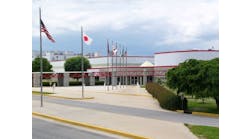Risk Management: Don't Let Delta Shut Down Your Business
This exclusive was provided by Dennis McCarron, a partner at Cardinal Brokers, one of the leading brokers in the tire and automotive industry.
The delta variant of COVID-19 has been all over the news in recent months. I want to take this opportunity to discuss how it is impacting tire stores differently than the original coronavirus strain, based on my own observations.
I won’t be getting into exact procedures to maintain safety protocols at stores and what steps you should be taking to protect your customers and employees. That’s a personal choice in how you run your business and there’s plenty of expert, science-based guidance on what businesses can and should do.
I want to focus specifically on how this strain is affecting stores nationwide.
When COVID-19 first hit, I was in touch regularly with more than 100 dealers across the nation. Some came to me for advice. Others were friends whom I contacted to see how they were doing during that very stressful time. We were also contending with how to work with Paycheck Protection Plan loans and Economic Injury Disaster Loans.
It was an extraordinarily complex first few months, but tire dealers across the nation showed that they were up to the task. The vast majority of tire dealerships stayed open during the entire 2020 phase of the pandemic and just as importantly, didn’t lay off any workers.
Dealers also followed protocols very closely. If an employee displayed symptoms of the virus, they were asked to get tested and if the result was positive, employees were asked to quarantine for 10 to14 days. Staffs would be a little short-handed, but it was manageable.
Today, the delta variant is the dominant strain across most of the United States. And it’s hitting stores very differently.
This is what I’m hearing from dealers and store managers — if one employee gets the delta variant, by the time they get tested, it has spread across the bulk of the store. Infections aren’t limited to one or two employees anymore. Delta can infect many more, which can force outlets to close.
Large tire retailers are also experiencing this. The difference, however, is that if they shut down a store, they have a hundred or a thousand other outlets that will continue to produce tire and service sales.
But smaller, independent dealerships — particularly those with one location — can see their sales drop by 30%, 50% or even 100%.
The great news is that tire dealers continue to prioritize the health and safety of their employees and are still taking the necessary steps to reduce transmission of the virus. But let’s look at some numbers. (I’m a numbers guy.)
Let’s say you are an average store, doing about $1.2 million in sales each year. At 5% net profit — the industry average is 3% and some stores net around 10% — that’s a net profit of $60,000 a year.
If your store closes for two weeks due to the delta variant infecting enough people to where you can’t be staffed properly, that’s a potential loss of $2,500.
This might not seem like a lot of money, but there are also intangibles to consider.
Shutting down involves loss of appointments and walk-ins. Many customers will then seek out another convenient place to get their needs met.
You also can potentially lose customers for quite a few cycles of maintenance. If they buy tires in that span, you’ve lost a set of tires for a few years, at best.
Additionally, rent is still due — just as utilities and other fixed expenses will remain.
Starting back up after you open is also a headache. You risk either an extended shutdown due to family members of employees getting exposed and sick, plus a lowered car count as customers may have been calling while your store was closed and are unsure of when or if you will be opening back up.
And there’s the possibility that an employee develops “long-hauler” COVID-19 symptoms and will lack the ability to come back at full strength for potentially months.
The bottom line is that delta is hitting differently. Its transmission is insidiously rapid. And you can only try to mitigate it.
I bring all of this to your attention to share what other independent tire dealerships and big box retailers have already had to endure. You should remain vigilant and do what you must to continue to protect both your employees and your business’ bottom line.




